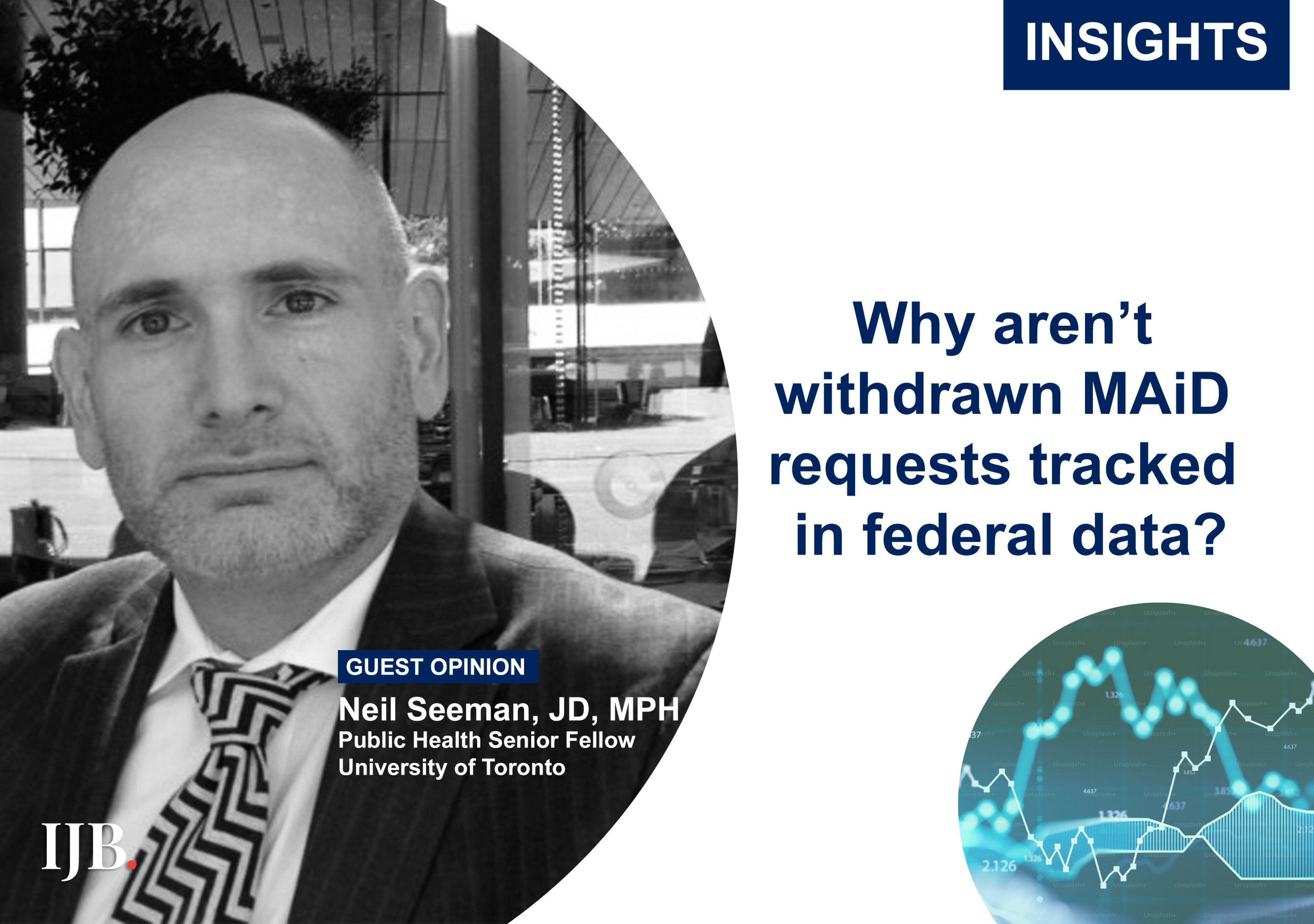

Neil Seeman is a senior fellow and associate professor at the Institute for Health Policy, Management and Evaluation at the University of Toronto, where he specializes in Big Data and health systems innovation.
People with severe disabilities have been told a wheelchair ramp costs more than an assisted death. Living in poverty and food insecurity have also been linked to the demand for MAiD.
These examples of vulnerable Canadians who have mostly gone unheard in the national conversation about medical assistance in dying highlight the importance of nuanced data collection to allow a complete understanding of the impact of MAiD. Missing from government databases, parliamentary reports and media stories, disabled and impoverished people often go unrepresented in the federal MAiD dataset. Also excluded are those who cancel a MAiD request before dying because palliative supports finally arrive; those withdrawals never appear in federal tallies.
Why are voices mostly silent? First, they aren’t asked to speak up. The federal database on MAiD lacks nuance and omits whether the applicant lacks safe housing, assistive tech or trauma-informed counselling—factors the UN says drive assisted-death demand.
Second, speaking up is hard. Patients self-censor because of stigma, clinicians fear scrutiny, and grieving families don’t fill out satisfaction surveys.
Third, MAiD supporters display confirmation bias. They cite rising uptake as proof of social licence, while critics find the rise alarming. Since the database is slim and blunt, ideologues with an axe to grind can cherry-pick data to support their claims.
The Investigative Journalism Bureau’s (IJB) MAiD data project shows just how thin the record is. Ottawa only receives what provinces choose to share, and what information they do share omits details of social determinants that are necessary to reveal coercion, abandonment, and unmet needs, leaving policy-makers and researchers in the dark.
The IJB unearthed what better data could reveal. Scraping more than 11,000 Ontario coroner rulings from 2016-23 showed that approvals where death is not reasonably foreseeable, often called Track 2, cluster in areas with high unemployment and scarce primary-care access—signatures of structural desperation more than autonomous choice. These insights, left off the official ledger, imply alternatives to MAiD lie not in personal choice, but societal solutions.
A disabled-rights advocate recently told me “MAiD is not as simple as politicians think. MAiD is messy.” Her lament echoes in Unravelling MAiD in Canada, a bold collection edited by Ramona Coelho, Sonu Gaind and Trudo Lemmens. The book’s contributors disagree on solutions but agree on one premise: measurement drives reality. If we record only dosage sheets and death certificates, we erase stories of consent, coercion and care denied.
Better Data Will Protect Silenced Voices
Three concrete steps to improve data collection could transform the MAiD debate. First, Canada needs a mandatory MAiD dataset that includes functional-needs scores, housing status, and supports offered. Privacy-preserving multiparty computation can allow comparisons between provinces. Second, an open MAiD data trust, housed at arm’s-length from government, letting journalists, academics and community advocates query de-identified microdata under Indigenous and disability-rights governance codes. Third, because quantitative data never paints a full picture, an archive of short audio diaries in English, French, ASL and Indigenous languages, searchable through sentiment analysis and human-verified before release, can bring qualitative context to the voices of MAiD users.
Critics fret about “datafication creep.” They are right that more data rows do not guarantee more justice. That is why any expansion must be co-designed by disabled persons, Indigenous scholars, racialized communities, caregivers to the elderly, and families who have confronted end-of-life poverty. They should own the dashboards and retain veto power over analyses that stigmatize.
The cost is modest—I estimate it to be well under one per cent of Ottawa’s palliative-care envelope—yet the return on investment is priceless: bringing legitimacy to the MAiD debate with authentic data. Canadians could finally see their true reflection in the MAiD mirror. Better data means you don’t have to trust an anecdote; patterns replace assumptions. After that happens, we can argue about solutions instead of facts.
In “What We Talk About When We Talk About Love,” poet Raymond Carver, whose life was cut short by lung cancer, wrote about love and life. What we keep silent from our expressions defines both, he says.
The same applies to death and MAiD; its reality lies not in what we know, but in what we omit.
Where the Official MAiD Dataset Falls Short
| Key dimension | Currently reported? | Missing or incomplete |
|---|---|---|
| Track 1 vs. Track 2 counts | Yes (annual totals) | No link to diagnosis, income or ethnicity |
| Disability status | Checkbox only | No functional-needs scale, no supports documented |
| Requests denied / withdrawn | Partial | No “why” field; no follow-up outcomes |
| Patient experience | None | No qualitative narratives or caregiver input |
- INSIGHTS: Why aren’t withdrawn MAiD requests tracked in federal data? - 18 July 2025
- INSIGHTS: Is poor planning the real problem in hospitals? - 11 July 2025
- INSIGHTS: Hospital complaints come with a silver lining - 20 June 2025